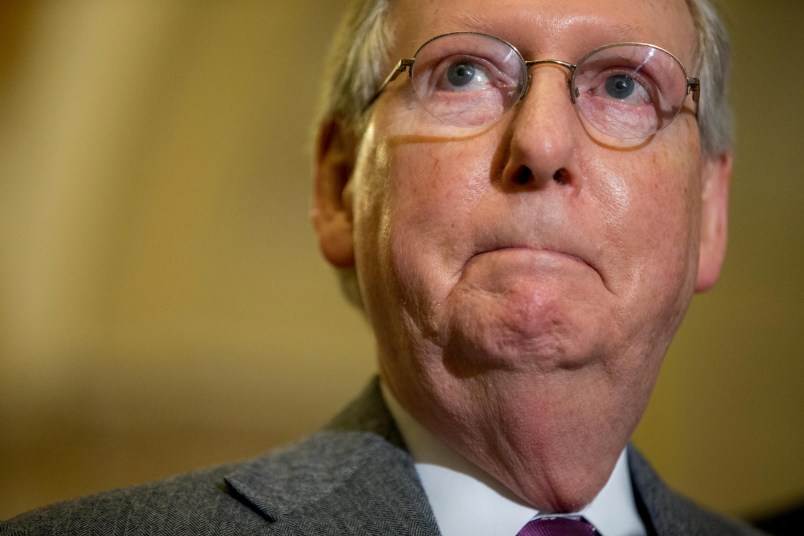If Republicans go through with their plan to dismantle the Affordable Care Act using a similar model as their failed 2015 Obamacare repeal, the number of uninsured would double, a new report by the Urban Institute report warns.
Taking into account the two or so year delay GOP lawmakers say they will include in the repeal bill, the non-partisan think tank estimates that in 2019 the number of uninsured nonelderly people would rise from about 29 million to nearly 59 million. The report also notes that since the 2015 version of the legislation repealed the individual mandate right away while delaying other repeal aspects, some impacts of the version the GOP might pass could be felt right away.
“The effects would begin in 2017 but would likely accelerate in 2018,” the report said. “Any changes to the market rules, mandate, or financial assistance after
premiums are set for the plan year would significantly disrupt coverage and care and would cause private financial losses for households and insurers.”
GOP legislative leadership says that Obamacare repeal will be its first order of business when the new Congress convenes in January, and that it will aim to get a repeal bill to then-President Trump’s desk soon after inauguration. They have been floating using the reconciliation process — which only requires a majority vote in the Senate — a strategy they also used in the 2015 attempt. That bill was vetoed by President Obama earlier this year.
Republicans promise that the two- or three-year delay will give lawmakers time to hash out a replacement, but the Urban Institute report notes that “presumably” GOP lawmakers are going that route because “a consensus did not exist on what form such an alternative should take.” The Urban Institute report points out that reconciliation only allows lawmakers to repeal budgetary aspects of Obamacare, while its market reforms and other regulatory provisions will remain absent unless that legislation could garner 60 votes.
“This scenario does not just move the country back to the situation before the ACA. It moves the country to a situation with higher uninsurance rates than before the ACA,” the report said. “To replace the ACA after reconciliation with new policies designed to increase insurance coverage, the federal government would have to raise new taxes, substantially cut spending, or increase the deficit.”
The report says that of the 30 million or so new people who would be uninsured if Obamacare is repealed without a replacement, more than 22 million would lose coverage because of the dismantling of the ACA subsidies, Medicaid expansion, and the individual market. It also predicts a “near collapse” of the individual market that would prompt another 7-million-plus people to lose their insurance.
Another implication of the Republicans’ Obamacare repeal effort is that uncompensated care would rise precipitously, a cost that would likely have to be borne by providers or by state and local governments if lawmakers go forward with legislation similar to the 2015 bill. That bill left in place cuts the ACA made in Medicare and Medicaid Disproportionate Share Hospital payments to hospitals.
“With the uninsured increasing by almost 30 million by 2019, uninsured people would seek an additional $88 billion in uncompensated care in 2019 and an additional $1.1 trillion from 2019 to 2028,” the report said.
Hospital groups released their own report Tuesday that also predicted major losses due to the rise in uncompensated care under the GOP repeal model.
Speaker Paul Ryan (R-WI) said over the weekend that Republican repeal efforts would leave Americans no “worse off.” His office clarified that the comment applies only to the so-called transition period into an alternative plan, but even on that premise, the Urban Institute report puts Ryan’s claim very much in question.











math continues to be hard for Wonder Boi and Company but fortunately for them the new administration has declared hard facts no longer exist…
This gives me a sliver of hope that they won’t even be able to repeal the ACA, but I’d rather not have it because I know these idiots will inflict maximum damage.
Since the law requires that emergency rooms treat all comers, and the government will be asked to reimburse ERs for the care they provide, guess who is going to pay the costs? You got it. This stunt is going to cost the US treasury a bundle. Of course, that won’t be acknowledged by Ryan and McConnell.
Repeat after me: They do not care if more people are uninsured. They do not care if people spend their life savings on end-of-life care. They do not care if people die from lack of medical treatment. They do not care if medical care costs more. They simply DO NOT CARE.
As Alan Grayson would say “the repugs would rather have Americans die than have health insurance”. Turtle boy prefers death for the poor as long as he has his government-paid-for health care.